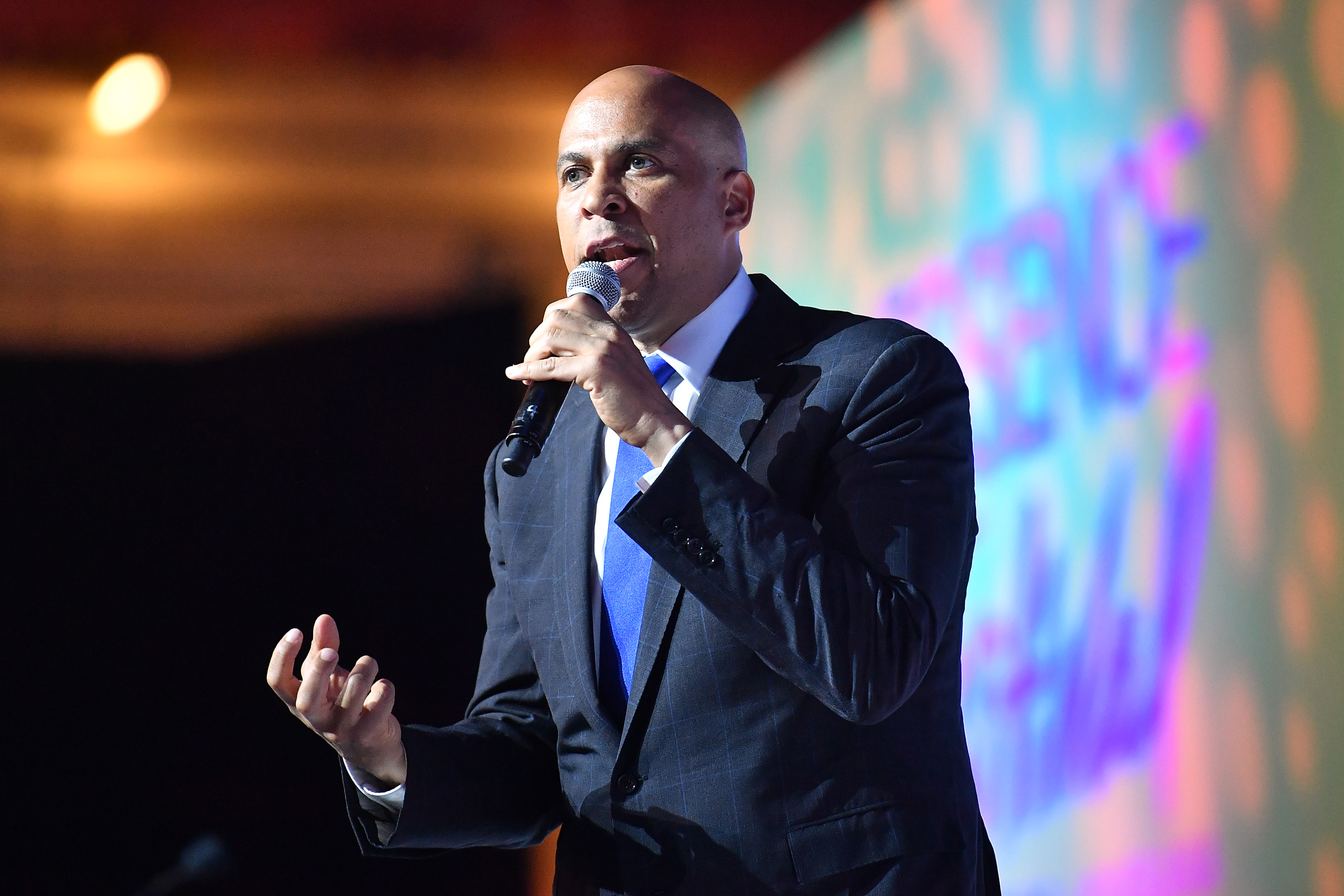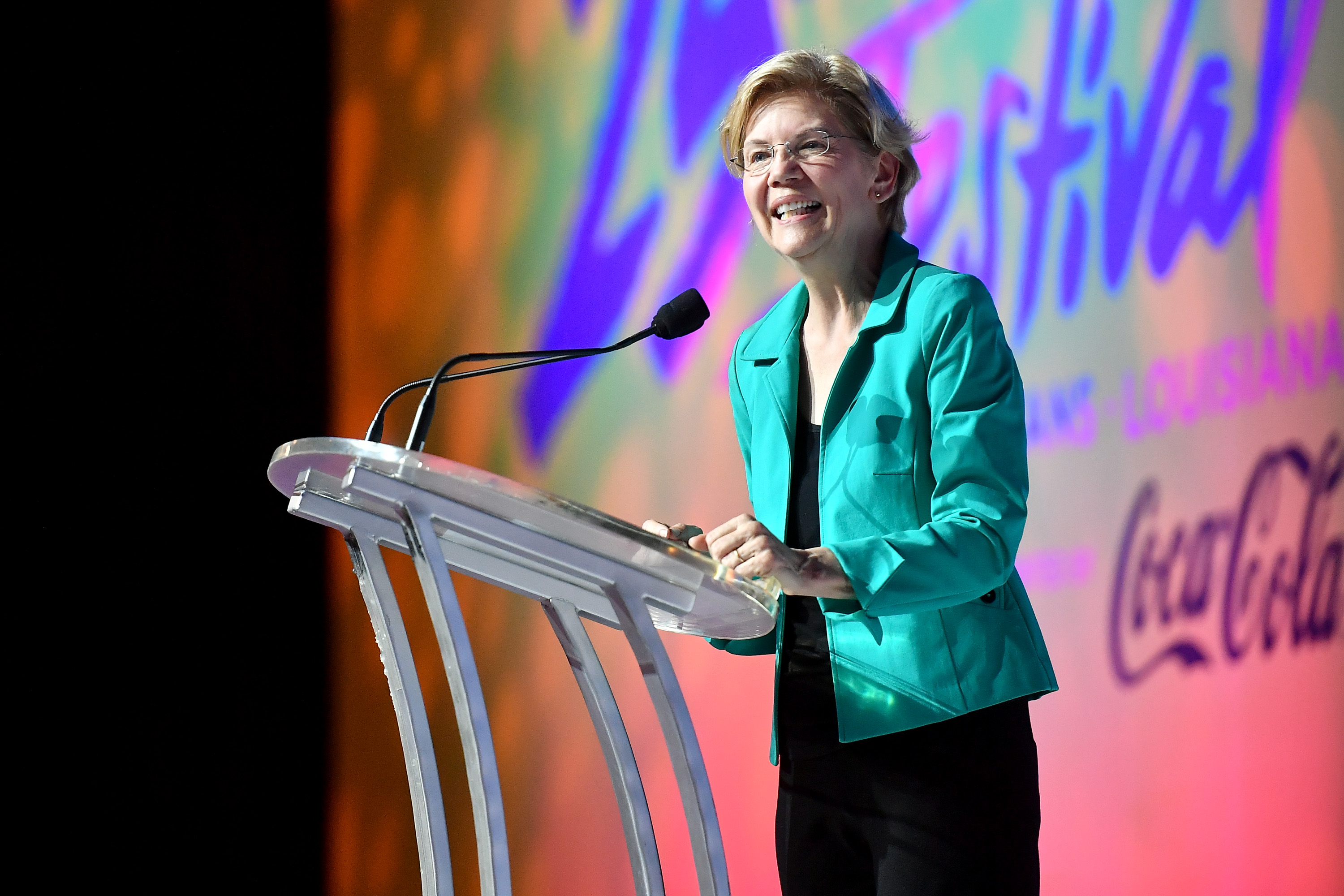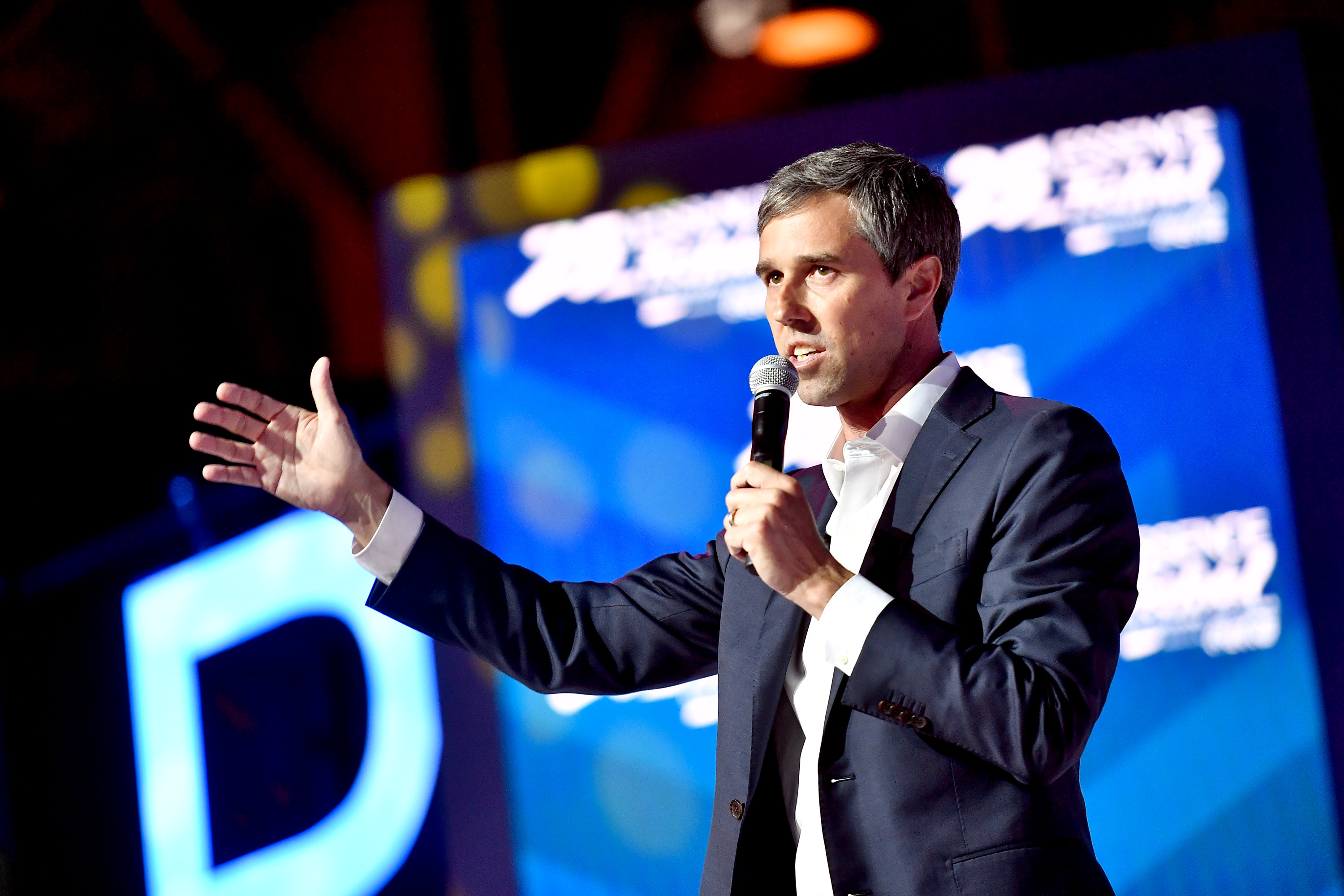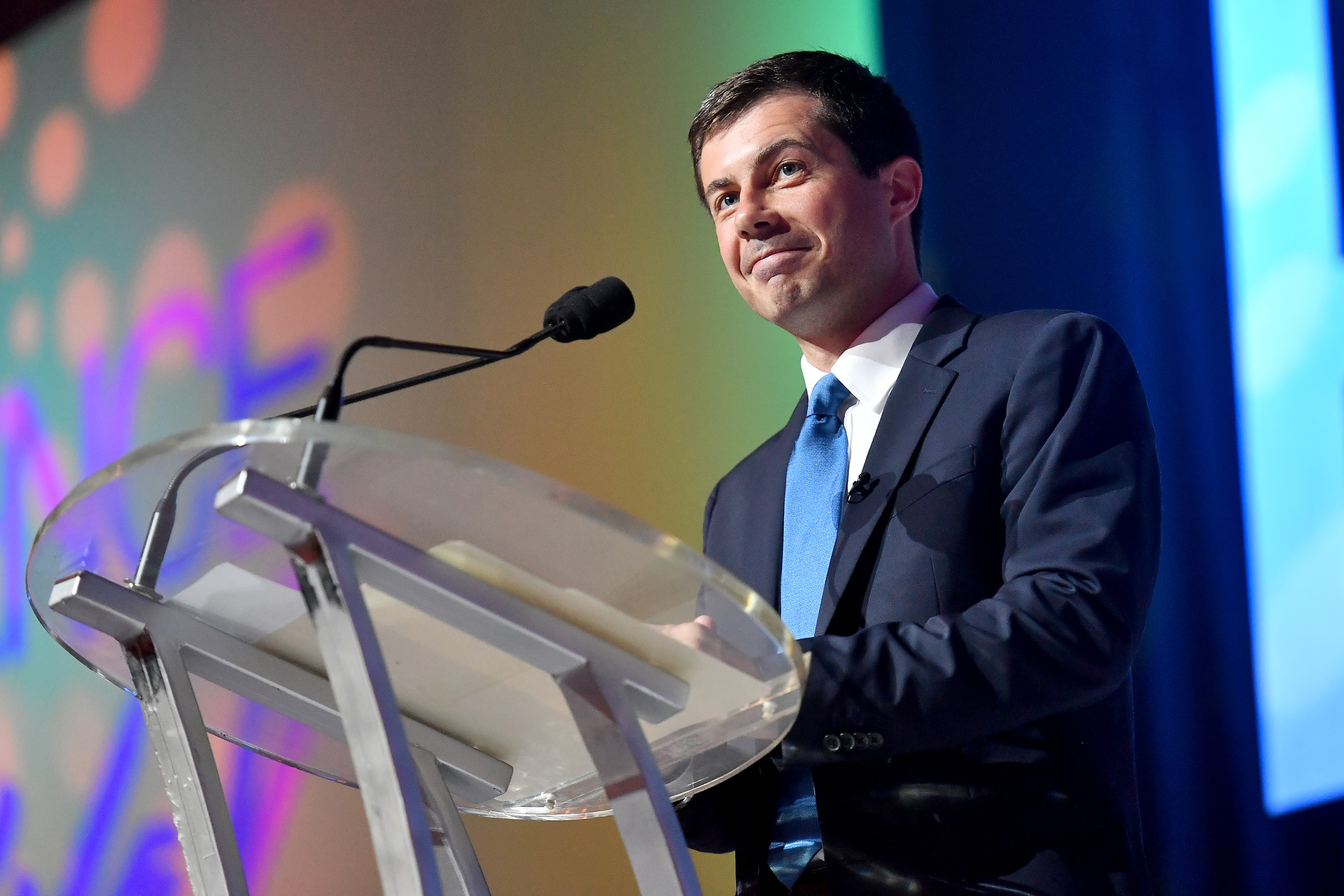When Kamala Harris walked onto the stage, grinning, to a standing ovation, she appeared utterly relaxed. Though joy isn’t a word commonly associated with politics, it seemed to apply to the California senator’s easy command of the stage, and the crowd there to see her, at the Essence Festival in New Orleans last weekend.
And if the arrival of a slew of 2020 Democratic candidates for president at the festival of black culture was a one-off competition for America’s black voters—and black women voters in particular—Harris clearly won. She earned the most thundering applause from an audience of a few thousand on a Saturday morning (the only politician to out-do her in sheer decibels was California Representative Maxine Waters), and women in the crowd I spoke with routinely listed her as one of their top two or three candidates.
Harris took the microphone with every reason to project authority. Not only was she a black woman running as one of the top candidates for president at an event centered on black women, with a history as the first black woman or black American to hold a series of elected seats, but, crucially for her campaign, she was one of the clear winners of the first Democratic debates.
Among black voters in particular, support for Harris has skyrocketed since her headline-grabbing standoff with former vice president and frontrunner Joe Biden over his views on bussing during the fight to end school segregation. According to two recent polls, she’s now trailing only Biden among black voters, and then not by much—24 to 36 percent in CNN’s poll, and 27 to 31 percent in a Quinnipiac University poll (a Washington Post–ABC News poll has her behind both Biden and Vermont Senator Bernie Sanders). With arguably the pivotal demographic for Democratic politics, she’s now neck-and-neck with the frontrunner, and she’s solidly in the top four candidates for voters overall. (Biden apologized for his remarks on Saturday, too late to counter Harris’ rise.)
Essence is also a music festival and magnet for black celebrities—its top guest of the weekend, without a doubt, was former First Lady Michelle Obama—and its daytime festivities were a candy-colored tempest of competing DJ booths (Sade’s “Sweetest Taboo”; Faith Evans’ “Love Like This Before”; Beyonce’s “Party”), black-owned businesses, corporate-branded entertainment, themed stages, and endless swag bags across a sprawling convention center. The underlying drum beat was black excellence, a phrase ubiquitous on its many stages, and black impact. Sponsoring brands staged massive pop-ups to jockey for the demographic’s outsized buying power and cultural influence with slogans like “Black + Positively Golden” (McDonald’s), “Dream in Black” (AT&T), and “Reign on” (the tag for Wal-Mart’s Zen-yoga-queen theme).
The political battle took place behind a towering black curtain on the “Power Stage.” Seven Democratic presidential hopefuls showed up to woo a critical voting bloc, laying out their plans to tackle persistent racial inequality and close wage, wealth, and health gaps between races. Most noted that black women earn 61 cents for every dollar a white man earns in America, that black women face maternal mortality rates three times that of white women, and that black women are also over-represented as entrepreneurs and household breadwinners.
Most talked about the legacy of redlining that disenfranchises black homeowners, about the need to support black business owners and tackle the costs of education. And each paid homage to the role of black women in the Democratic Party, calling them the “bone and sinew,” as South Bend, Indiana, Mayor Pete Buttigieg put it; the “heart and soul” as former Texas Congressman Beto O’Rourke phrased it; and the “center of every movement for social justice in our country” in the words of New Jersey Senator Cory Booker. Some in the audience saw attendance here not just as a sign of respect from candidates, but a political necessity—a view not shared by the campaigns of Biden and Sanders, two leading and missing contenders.
Colorado Senator Michael Bennet took the stage first—one of two last-minute additions to the schedule—and earned applause for hammering on the need to improve education. He was followed by New York Mayor Bill de Blasio, the other latecomer, who rallied some in the crowd with a call for change in Washington. Each spoke briefly and seemed like mere warm-ups for the woman in the champagne suit who brought the crowd to its feet.
“Good morning!” Harris cried. Applause lingered through cheers of “Ka-ma-la!” “Good morning, my beautiful sisters,” she said.
Harris won the loudest cheers for the details of her new plan to shrink the racial wealth gap by investing $100 billion to boost homeownership among people of color; for calls to improve health care for black women and support historically black universities and colleges (HBCUs); and for plans to require the Department of Justice to review abortion laws from states with “a history of interfering with a woman’s access to choice” for constitutionality (known as preclearance, the process applied to voting laws passed by certain states under the Voting Rights Act until the Supreme Court overturned the relevant provision in 2013).
But it was her kicker that brought the house down.
“Black women know, we know America’s story has always been written by those who can see what can be, unburdened by what has been,” she said. “The fight of black women has always been fueled and grounded in faith and in the belief of what is possible. We have always built the future that we can see, and believe in and fight for. And that’s why Sojourner spoke, it’s why Mae flew, it’s why Rosa and Claudette sat, it’s why Maya wrote, it’s why Fannie organized, it’s why Shirley ran, and it’s why I’m standing here as a candidate for the presidency of the United States!”
Shannon McNeal leapt out of her chair. “It’s either Kamala or Elizabeth Warren,” she told me. “Period. The end.” The 30-year-old lawyer based in Washington, D.C., and raised in Montgomery, Alabama, believes Harris is a “truly progressive prosecutor, and I know that term really turns some people off, but I think she is that.” McNeal loved watching Harris dominate both seasoned and green competitors during the debate, she said. “I think she is someone who could take on Donald Trump and embarrass him, frankly.” In Warren, she sees a track record of helping those with lower socioeconomic status, including the Dodd-Frank Act, created to reign in Wall Street and protect consumers after the 2008 financial crash.
Ashanti Spells, 17, who traveled from North Carolina to volunteer for Harris’ campaign during the festival, chanted and waved signs outside the stage’s curtains. Spells was already “starstruck” before Harris announced her bid for the Oval Office, and “a lot of the things in her campaign right now go right along with my situation, what I’m going through with my mom, as far as her 3 a.m. agenda, stressing about paying the bills,” she said.
For McNeal, Biden isn’t an option, and neither is Booker. “He does not pass the genuine test for me, and I don’t know what that is, but I don’t like him.”

(Photo: Paras Griffin/Getty Images for Essence)
Booker received less love from a diminished crowd when he took the stage an hour later, despite coming out fighting in black suit, blue tie attire. He pointed a finger as he shouted into the microphone, eschewing the podium and instead pacing the stage as he praised the power of black women—including his mother—and promised to turn the tide of inequality. The crowd clapped when he said health care should be a right; promised that he’d take the fight to the “corporate gun lobby and the [National Rifle Association] like they have never, ever seen before”; and laid out plans, like his oft-cited “baby bonds,” to “actually address the past economic harms that were purposely done, because of white supremacy, and the persistence of racism in our country.”
Gina, a 67-year-old teacher from Sacramento, California, believes Booker has policies that “would have a far-reaching impact” in the black community. “I think he brings an enthusiasm and a vibrancy, and I think he’s a very intelligent, astute politician,” she said. But she still favors Harris: “I think she’s courageous. She knows that, in order for us all to rise, all of us have to have a place at the table.” Gina’s also considering Sanders, whose promise of tuition-free post-secondary education has earned her respect. Biden, however, is further down the list: “I think he has a good philosophy in his politics. I just don’t know, as a black woman, that he has the sensitivity to understand and advocate for the needs of the black community.”
Warren spoke third, and the seats filled again to hear the woman who wields plans like seemingly endless tools from a Swiss Army knife. Warren was the only speaker to bring along her own surrogate to introduce her (most were brought on stage and later interviewed by cable news host and civil rights activist Reverend Al Sharpton). Ashlee Marie Preston, a writer, media figure, and black trans woman, briefly praised Warren before the rising cheers drowned her out.

(Photo: Paras Griffin/Getty Images for Essence)
Warren, who brought her signature blend of Oklahoma-tinged common sense and economic outrage in one of her signature bright blazers (teal, this time) and black slacks, earned the loudest roar for her “wealth tax” (it would increase taxation on households with a net worth at $50 million or more), and her plan to use that money for universal childcare, universal pre-K, free post-secondary tuition, $50 billion for HBCUs, and—the cheers crescendoed—canceling student loan debt.
“I have a plan to deal with the maternal death crisis in this country. I have a plan to value the work of black women—no more vague talk on this,” she said as she promised to enforce equal pay and workforce diversity among all federal contractors, before closing amid a standing ovation.
Warren is the top choice, the only choice, for two women who were sitting in the back of the auditorium, Tamarr Varisco, 32, and Danyel Gibson, 42, from Los Angeles, California. “She has a lot of strong beliefs and a lot of power that she’s gonna bring to what we need—a lot of change—and to get that orange Cheeto out of there,” Varisco said. “Student loan forgiveness, helping black women thrive in America. I mean, just empowering the entire society. We’ve taken so many steps back that now it’s time. We need to take our country back, and keep moving forward.”
“I cannot wait to celebrate and have a party once we have the first female president,” Gibson added. “And it’s her, it’s her.”

(Photo: Paras Griffin/Getty Images for Essence)
By the time O’Rourke appeared, it was late afternoon, the seats half-empty. O’Rourke’s campaign is struggling to gain traction with donors and voters, black voters included (he’s one percentage point below Marianne Williamson, Oprah’s spiritual adviser, according to one recent poll), but he, too, earned applause from the crowd as he spoke of instituting a “true living wage”; passing the Equal Rights Amendment; defending women’s reproductive choice and ensuring black women have access to the “full spectrum” of maternal health care; and passing a voting rights act “so that Stacey Abrams can become the rightful governor of Georgia.” The crowd cheered his plans to make college debt-free for middle- and low-income students, give more money to HBCUs, and “t[ie] that to teacher training, so that we get more teachers in the classrooms who look like the students in front of them.” Wandering the stage in a black suit, sans tie, he also spent a good deal of his time praising black women’s activism.
O’Rourke is exactly the kind of candidate Democratic voters need to be open to right now, in the minds of New Orleans residents Dana French and Carla Short.
“Beto just really transcends race,” French said. “He is a guy that I think is just so real and passionate about his issues regarding working-class people.” She praised his early political career pushing progressive policies in El Paso. “In terms of his strength and character, Beto just absolutely stands out to me,” she added, calling him “resilient.”
“I like the fact that he’s ready to listen and to learn,” Short said. O’Rourke had spent the morning with residents in New Orleans’ Lower Ninth Ward. “I appreciate that you didn’t just come here for this and you flew off,” she said, referencing the festival. “You were here with a purpose.”
Both agreed the Democratic Party needs change. Black voters shouldn’t just “go based on what’s familiar to us,” Short said, a reference to Biden, whose presence was felt even in his absence. “We cannot go back to things as usual,” French added.
The final speaker of the weekend—Buttigieg—had to wait until Sunday morning. If that sounds like a bump from main billing, it’s exactly the opposite. The auditorium was packed for gospel worship with a line trailing out beyond the curtain, and Buttigieg had the exceeding luck, especially for a candidate polling outside the top four overall and at zero with black voters, of speaking in between New Orleans’ popular mayor, Latoya Cantrell, and the artist and filmmaker Tyler Perry (on track to become “Hollywood’s first black male billionaire” according to the New Yorker).

(Photo: Paras Griffin/Getty Images for Essence)
If the crowd wasn’t rapt for the lesser-known candidate (“Who is he?” one woman asked her neighbor), it was attentive, and Buttigieg (navy suit, bright blue tie) drew his strongest applause for proposing that all companies publish their gender pay gaps (part of his “Douglass plan” to tackle systemic racism); for promising to appoint a “Secretary of Education who actually believes in public education”; for calling hair discrimination racial discrimination; and for declaring that “we are not safe until we have confronted and ended the threat of violent white nationalism.” He added that he wants to change policing so that black and white drivers feel “exactly the same” when they encounter police officers.
Buttigieg also took responsibility once again for the controversy surrounding policing in South Bend, after drawing fierce criticism in the wake of a police officer’s shooting of a black man, Eric Logan.
After his speech, Buttigieg rose to the top candidate not just for Jacqueline Agbo, a 53-year-old from Wichita, Kansas, but her mother, too, who was listening beside her. “I think he’s extremely sensitive to our issues, and I think he’s the best so far that has addressed the issues,” Abgo said, though Harris remains her second choice. She first noticed Buttigieg when he denounced police violence in his city, and she believes his own experience as a gay man gives him the ability to appreciate the prejudice experienced by others. She likes his positions on equal pay and criminal justice reform, and thinks he was bold to mention reproductive rights during what amounts to the festival’s church service.
For Agbo, Buttigieg is the future, Biden the past. “I love Joe,” she said. “But he’s still part of the gold old boys’ network. He’s not ‘woke’ as the kids say, and I don’t see him stepping out to do anything different.”
Before Buttigieg took the stage, Julie, a 48-year-old from Florida, thanked him for his comments on religion. Buttigieg, a Christian, has denounced the idea that his faith belongs, politically, to Republicans, especially amid the detention of immigrant children in squalid conditions. “I’ve heard him talk about what being a Christian really means, and how the Republican Party has hidden behind this cloak of Christianity,” she said.
“Look at all these black women here, we’re all from everywhere,” Agbo added, gesturing to the women who had heard Buttigieg’s message. “I guarantee you he made a roomful of fans.”
But the weekend, without a doubt, belonged to Harris. As she spoke, the crowd laughed, cheered and threw their hands up; they waved her on as she slammed President Donald Trump—who otherwise went mostly unmentioned—as a predator. When Sharpton asked if she thought she could win the election, she jumped at the pitch: “I’m ready,” she pronounced, launching into a long, rhythmic answer that culminated in a cry for “a new commander-in-chief!”
“Amen!” someone yelled above the raucous cheers. “Amen!”




